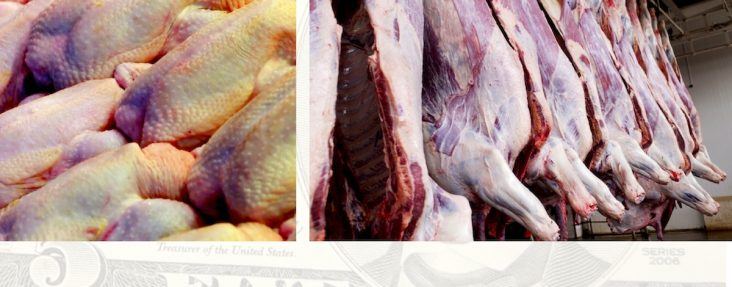Tyson Foods, meat processors call for repeal of COOL meat label after tariff ruling
by December 8, 2015 4:38 pm 604 views

Tyson Foods and most of the commercial meat industry aren’t happy with the recent World Trade Organization ruling that allows for $1 billion in retaliatory tariffs related to federal product labeling rules.
The tariff decision, handed down Monday (Dec. 7) by the World Trade Organization, stems from complaints lodged by Mexico and Canada over the 2009 U.S. meat labeling law that requires country-of-origin disclosure for animals coming from those countries and processed in the U.S. (Link here for the case history.)
The WTO previously found that the country-of-origin labeling law (COOL) put Canadian and Mexican livestock at a disadvantage. The WTO ruling allows Canada to impose $780 million in retaliatory tariffs and Mexico to seek $228 million against the U.S. meat industries for damages they’ve sustained from the law.
News of the tariffs – expected to hit before the end of the year – also weighed on the commodity markets. Live cattle futures spot December slid nearly 3% to close at today (Dec. 8) at $1.213 per lb., and February cattle fell $2.975 to close at $1.2675 per pound. This was the second day for declining cattle prices since the WTO tariff ruling.
“We believe this labeling law must be repealed before Mexico and Canada, two of our top trading partners, retaliate with damaging tariffs. This law has increased the U.S. meat industry’s operating costs, unnecessarily hurting livestock producers without providing any additional value to our customers and consumers,” said Gary Mickelson, spokesman for Tyson Foods Inc.
The U.S. House of Representatives repealed the 2009 law in June for beef and pork labels at the urging of the meat lobby and the Canadian government. The Senate has not followed suit. Canada has said COOL discriminates against Canadian and Mexican cattle and hogs and violated the trade obligations of the United States.
CALL TO ACTION
There is growing support in the Senate to take action now that the tariffs have been approved. Senate Agriculture Chairman Pat Roberts, R-Kansas, said Monday he will look for “all legislative opportunities” to repeal the labeling law.
“We must prevent retaliation, and we must do it now before these sanctions take effect,” Roberts said.
U.S. Sen. John Boozman, R-Ark., said the dispute must be resolved to avoid a negative impact on the Arkansas and national economies.
“We must ensure that Arkansans are not caught in the middle of a dispute over well intended, but poorly crafted policy,” he noted in a statement.
The tariffs “come as little surprise” and “will be a devastating blow to both our national and state economies,” U.S. Sen. Tom Cotton, R-Ark., noted in his statement.
Boozman and Cotton agreed the economic impact to Arkansas alone would be tens of millions of dollars given that agriculture is the state’s largest industry.
The American Farm Bureau Federation has called for a Senate repeal of the COOL requirements.
“These tariffs would place our nation’s farmers and ranchers at serious risk. We urge the Senate to act now to repeal country-of-origin labeling for beef, pork and chicken and eliminate the threat of damaging tariffs on U.S. agricultural exports to Canada and Mexico,” said AFBF President Bob Stallman.
DISSENTING VIEW
While there is support for repealing the COOL requirements, not everyone in the agricultural arena agrees. Cattle producers affiliated with R-CALF USA , continue to support mandatory country-of-origin labeling.
“Congress should take no action to repeal COOL or weaken it by converting it to a voluntary program,” Bill Bullard, CEO of R-CALF USA, said in a statement. “Instead, Congress should direct our U.S. Trade Ambassador to negotiate a diplomatic solution to Canada’s and Mexico’s complaints by deploying the United States’ substantial negotiating skills. After all, this is precisely how the United States resolved country-to-country disputes before the U.S. began ceding its sovereignty to the unelected and un-appointed tribunal at the WTO.”
Bullard said Congress should also direct U.S. Agriculture Secretary Tom Vilsack “to immediately begin promulgating new COOL rules to close some of the loopholes identified in the WTO dispute that are effectively limiting the effectiveness of COOL.”
LOBBY SUPPORT
That said, meat industry lobbies for pork producers, chicken processors and meat packers are convinced their industries will suffer tremendous financial harm if the law stands and the tariffs are levied.
The National Pork Producers Council (NPPC) cited research by Iowa State University economist Dermot Hayes that showed the average U.S. pork producer is losing money on each hog marketed.
“America’s pork producers need congressional lawmakers to recognize the imminent harm our economy faces,” said Dr. Ron Prestage, NPPC president. “Retaliation has been authorized, and our exports to the No. 1 and No. 2 markets will suffer and so will US farmers, business people and consumers.”
National Cattlemen’s Beef Association warned that U.S. beef exports will face a 100% tariff in Mexico and Canada, diminishing about $2 billion of beef exports annually, if the Senate does not repeal the law. Last year the U.S. exported 364 million pounds of beef to Canada and 435 million pounds of beef to Mexico, according to federal statistics.
The National Chicken Council (NCC) is concerned that the WTO ruling will also open the door for more countries to retaliate with tariffs that would further hinder poultry exports already reduced by Avian Influenza bans.
